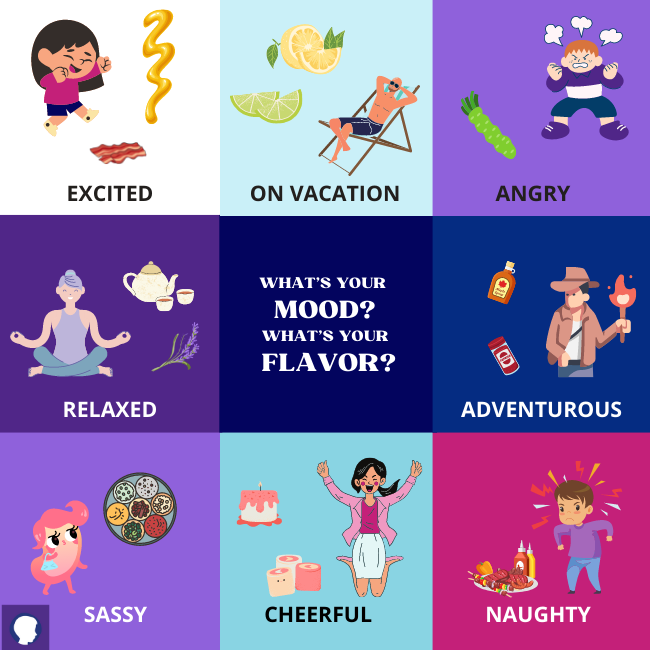Flavour is more than just a matter of taste—it’s a powerful experience that can spark emotions, unlock memories, and even change our mental state. Whether it’s the comforting taste of vanilla, the zesty zing of lemon, or the rich indulgence of chocolate, flavours have a deep and direct influence on our mood and cravings. In this article, we explore the science and psychology behind this flavorful connection.

What Are Flavours, Really?
Flavour is not just about taste. It’s a multi-sensory experience that involves:
- Taste (sweet, salty, bitter, sour, umami)
- Smell (aromas that travel through the nose and mouth)
- Texture and mouthfeel
- Visual appearance
Together, these elements create the overall flavour profile of food—and each one can trigger emotional and psychological responses.
The Science Behind Taste and Emotion

How the Brain Processes Flavour
When we eat, our brain integrates signals from the taste buds, olfactory system (smell), and even visual cues. These signals activate the limbic system, the part of the brain involved in emotion, memory, and reward.
Certain flavours can stimulate the release of feel-good neurotransmitters like:
- Dopamine – associated with pleasure and reward
- Serotonin – stabilizes mood and promotes happiness
- Endorphins – natural mood lifters that reduce stress and pain
This explains why you might feel uplifted after biting into a warm, gooey brownie or comforted by a bowl of chicken soup.
1. Sweet Flavours and Happiness
There’s a reason why sweet foods are often called comfort foods.
- Sugar increases serotonin levels, which helps regulate mood and combat stress.
- Sweet flavours are often associated with celebrations, nostalgia, and childhood memories—triggering positive emotions.
But beware: too much sugar can lead to crashes and irritability. Moderation is key.
Try This:
- Enjoy fruit-based desserts like strawberries dipped in dark chocolate for a healthy sweet fix.

2. Spicy Flavours and Excitement
Spicy food creates a mild pain response, which triggers the release of endorphins—the same chemicals released during exercise or laughter.
- Chilies and hot spices stimulate adrenaline, giving a natural energy boost.
- They create a feeling of euphoria known as the “spicy high.”

Positive Impact:
- Enhances alertness
- Creates feelings of excitement and adventure
3. Sour Flavours and Focus
Sour tastes like lemon, lime, or vinegar have a zesty, sharp profile that wakes up your senses.
- Sour flavours stimulate saliva production and digestion.
- They are also mentally invigorating and can boost alertness.
Quick Tip:
- Start your day with a glass of lemon water to feel refreshed and mentally sharp.

4. Bitter Flavours and Sophistication
Bitter flavours like dark chocolate, coffee, or kale are often acquired tastes. But they can evoke a sense of elegance and mindfulness.
- Bitterness can signal antioxidant-rich foods, which are beneficial to health.
- They engage complex neural pathways, encouraging slower eating and appreciation of taste.
Emotional Influence:
- Encourages calmness, thoughtfulness, and self-discipline.
5. Salty Flavours and Cravings
Salt is essential for survival, which is why we crave it.
- Salty snacks trigger the brain’s reward system quickly, creating an almost addictive response.
- They also evoke feelings of comfort and satisfaction.
Caution:
- Excessive salt can lead to water retention and mood swings. Choose naturally salty options like olives or nuts.
6. Umami and Deep Satisfaction
Umami, or “savoury,” is the taste of protein-rich foods like mushrooms, soy sauce, meat, and cheese.
- Umami flavours enhance satiety and make meals feel more complete.
- They trigger dopamine release and signal nourishment and warmth.
Mood Benefits:
- Deep satisfaction, relaxation, and contentment after meals
7. Aromatic Flavours and Memory Triggers
A huge part of flavour is aroma. The olfactory system is directly connected to the brain’s memory center—the hippocampus.
- A whiff of cinnamon might remind you of holidays.
- Freshly baked bread might take you back to your childhood kitchen.
Sentimental Power:
- Smells can evoke strong emotional responses—both positive and negative—faster than visuals or sounds.
Flavours and Mental Health: A Growing Field
Modern psychology and nutrition are increasingly exploring the concept of nutritional psychiatry, where diet—including flavour—is seen as a component of mental health.
- Certain diets high in diverse flavours and whole foods have been linked to lower rates of depression and anxiety.
- A boring or bland diet can lead to emotional stagnation or food fatigue.
Final Thoughts: Let Your Taste Buds Lift Your Spirits
Flavours aren’t just about eating—they’re about feeling. Each bite you take sends messages to your brain, influencing your emotions, your focus, and even your energy levels. By understanding how flavours affect your mood and cravings, you can make more mindful, joyful food choices that enhance both body and mind.
So next time you reach for a snack or sit down to a meal, pause and consider: How do I want to feel today? Then let your flavour choices guide the way.
Need help creating flavour-inspired content for your bakery or food brand? Let AI craft your next post, product description, or campaign with mood-boosting words that your customers will crave.
Can certain flavours really influence my mood?
Yes, flavours can trigger emotional responses by stimulating brain chemicals like dopamine and serotonin, which are linked to mood and pleasure.
Why do I crave sweet or salty foods when I’m stressed?
Stress can increase your desire for high-reward flavours like sweet or salty foods because they provide quick comfort and stimulate the brain’s reward system.
Which flavours are best for boosting happiness?
Sweet and umami flavours are commonly associated with pleasure and satisfaction. Vanilla, chocolate, and savory dishes can help elevate mood naturally.
Read more…..



